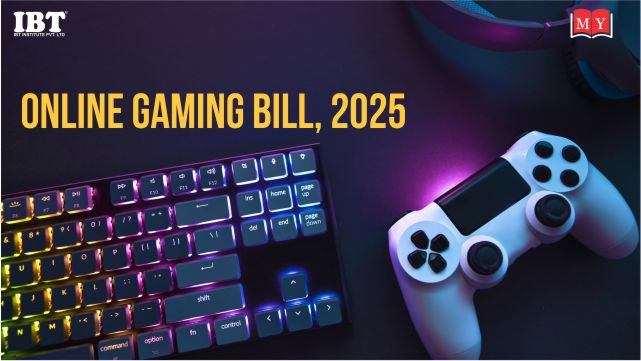Online Gaming Bill, 2025

Online Gaming Bill, 2025
-
Name & Status: The “Promotion and Regulation of Online Gaming Act, 2025” was passed by both Houses of Parliament (Lok Sabha on 20 August 2025, Rajya Sabha on 21 August 2025) and received the President’s assent on 22 August 2025.
-
Purpose: To provide a legal framework regulating online gaming in India — including prohibiting online money games (i.e. games involving monetary stakes), promoting safer forms of gaming like e-sports and social games, protecting users (especially minors), and preventing harms like addiction, financial loss, fraud.
-
Territorial Extent: Applies throughout India, including to games operated from outside India if they are accessible to Indian users.
Key Definitions
Some of the important definitions under the Act are:
-
Online Game: Any game played on electronic/digital devices over the internet or other communication means.
-
Online Money Game: A game (whether based on skill, chance, or both) where a user deposits money or other stake expecting monetary or other reward (this includes things like credits, coins, tokens convertible to money).
-
E-Sport: Competitive games, multiplayer, governed by rules, relying on skills (mental agility, strategy, etc.), could involve entry/reg fees and prize money, but must not involve stakes or expectation of gain from stake (i.e. no betting elements).
- Online Social Game: Games for recreation, entertainment, skill-building, etc., where there are no stakes in the sense of monetary risk from loss/gain via money games. (Usually non-monetary or subscription / non-stake based).'
What it Prohibits
The Act bans a number of things related to online money gaming:
-
Offering / Aiding / Abetting: No person is allowed to provide online money games or help in running them.
-
Advertising / Promotion of online money games is prohibited. That includes direct or indirect advertising or inducement.
-
Financial Transactions: Entities like banks or financial institutions must not facilitate payments or authorizations for online money games. That means both the platform and the payment handlers can be held liable.
-
Blocking: The government can block access to real-money gaming services (if they breach the law) even if they are outside India, if they are accessible to Indian users.
Regulatory / Promotive Measures
While banning or restricting money games, the Act also includes constructive/promotive elements for other kinds of gaming:
-
Recognition & development of e-sports: The Act empowers the government to recognise, register, regulate, and promote e-sports, support tournaments, infrastructure, research, etc.
-
Promotion of online social and educational games: Encouraging games that are non-monetary (no financial stakes), those which build skills, help learning etc. These can be registered, recognised, and promoted under the law.
Authority & Enforcement
-
Authority on Online Gaming: The Act allows the central government to establish an “Authority on Online Gaming” (or designate an existing authority) which will have powers to classify games, determine whether a game is a money game or no, register / recognise games, issue rules, enforce compliance, etc.
-
Penalties:
|
Offence
|
Penalties
|
|---|---|
|
Offering online money games
|
Up to 3 years imprisonment, fine up to ₹1 crore. Repeat offences may have higher penalties.
|
|
Advertising online money games
|
Up to 2 years imprisonment, fine up to ₹50 lakh.
|
|
Financial facilitation (banks etc.)
|
Also liable under the Act.
|
-
Other enforcement tools: The Act gives power to block access to offending platforms, remove / disable content, etc. Also powers to investigate, etc.
- When It Comes Into Force: The Act is passed and in law, but not yet enforced. It will be enforced on 01st October 2025. Until that date, the prohibition / regulation provisions don’t apply.
Implications / Explanation
-
This is a blanket ban on online money games, regardless of whether they are “skill-based” or “chance-based”. Many games which earlier claimed to be “games of skill” (e.g., fantasy sports, certain quiz / prediction games, etc.) are swept under the ban if users pay or stake money expecting reward.
-
Platforms that previously operated real money games will need to shift models (if they want to stay legal) — either move to non-monetary versions (social games), or get registered as e-sports platforms under the conditions the Act prescribes. They will also need to remove or stop facilitating deposits, etc.
-
Advertisers, influencers, and media channels will need to be careful: promoting/broadcasting advertisements for real money games can lead to penalties. Those who advertise such games (directly or indirectly) are liable.
-
Financial sector / payment infrastructure is affected: Banks, payment services, etc., must not facilitate money flows for prohibited games. They could face liability.
-
For users: Participating in money games could, in future, lead to risk (platforms shut down, access blocked, etc.). Also, safer options (e-sports, social games) will be promoted.
-
For the “game ecosystem / industry”: Real money gaming businesses (fantasy sports, betting, etc.) could see drastic disruption. There is concern about job losses, revenue losses, investor pull-back. On the other hand, e-sports and non-monetary gaming may get more government support (recognition, infrastructure, policies).
-
Legal / Constitutional challenges are likely, e.g. over definitions, over the sweeping nature of the ban, whether skill games merit exemption, over federalism (states’ powers), etc. Some industry stakeholders have already expressed concern
1 like |
0 comment
 4.5/5
4.5/5








